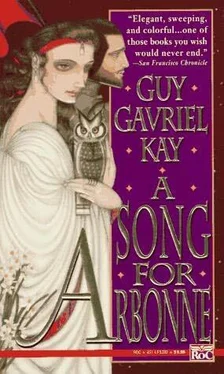Guy Kay - A Song for Arbonne
Здесь есть возможность читать онлайн «Guy Kay - A Song for Arbonne» — ознакомительный отрывок электронной книги совершенно бесплатно, а после прочтения отрывка купить полную версию. В некоторых случаях можно слушать аудио, скачать через торрент в формате fb2 и присутствует краткое содержание. Год выпуска: 1992, Жанр: Фэнтези, на английском языке. Описание произведения, (предисловие) а так же отзывы посетителей доступны на портале библиотеки ЛибКат.
- Название:A Song for Arbonne
- Автор:
- Жанр:
- Год:1992
- ISBN:нет данных
- Рейтинг книги:5 / 5. Голосов: 1
-
Избранное:Добавить в избранное
- Отзывы:
-
Ваша оценка:
- 100
- 1
- 2
- 3
- 4
- 5
A Song for Arbonne: краткое содержание, описание и аннотация
Предлагаем к чтению аннотацию, описание, краткое содержание или предисловие (зависит от того, что написал сам автор книги «A Song for Arbonne»). Если вы не нашли необходимую информацию о книге — напишите в комментариях, мы постараемся отыскать её.
A Song for Arbonne — читать онлайн ознакомительный отрывок
Ниже представлен текст книги, разбитый по страницам. Система сохранения места последней прочитанной страницы, позволяет с удобством читать онлайн бесплатно книгу «A Song for Arbonne», без необходимости каждый раз заново искать на чём Вы остановились. Поставьте закладку, и сможете в любой момент перейти на страницу, на которой закончили чтение.
Интервал:
Закладка:
"Thank you. And so, I must say, is your reasoning and anticipation, your highness. You have completely preempted my own first words." Bertran's expression and tone were grave.
Daufridi remained amused. "I am disappointed now. Will political expediency cause a poet to so renounce his own creation?"
Blaise had heard tales about this king, about the keen-edged, fierce intelligence, a hitherto absent quality among the ale-sodden, brawling kings of watery Valensa. The very terms of the Treaty of Iersen Bridge, if nothing else, would speak to Daufridi's competence. Money given, if a great deal of it, in exchange for land sought and not won in fifty years of war. It didn't take a brilliant mind to judge who had gained the better of that treaty—if one left out what Gorhaut could now do with peace assured on its northern borders. Blaise wondered, for the first time, if those Portezzan negotiators Valensa had employed had really shaped the exchanges of letters and emissaries leading up to the treaty, or had merely acted as trained mouthpieces for the will of this shrewd, hard king.
He had wanted so much to kill this man two years ago.
He remembered hammering his way in grief-stricken rage towards Daufridi in the agonizing moments after his own King Duergar had toppled like a great tree from his saddle with that arrow in his eye, his death cry towering like a raven of the god in the frigid northern air. Blaise could hear it now, if he but closed his eyes. It had been Cadar de Savaric, Rosala's father, who had battled through to Daufridi first and inflicted that savage red wound, before dying under the maces and axes of the king's guard. Two giants of Gorhaut slain within moments of each other.
Two men who would have disembowelled themselves, Blaise thought bitterly, before signing the treaty of Iersen Bridge. The treaty his own father had so slyly devised, surrendering the ancient northlands of Gorhaut for Valensan gold, with his own designs dark-hidden in the shadows.
"I had always thought," Daufridi was saying, smiling that thin, cool smile of his beneath the full, greying beard, "that the troubadours valued nothing in this transitory world of ours so much as the sanctity of their art. Will you tell me now I was wrong all this time?"
Bertran, in the chair opposite the king, refused to be baited. Blaise sensed that the duke had prepared himself beforehand for something of this sort.
"All other things being equal," Bertran said quietly, "we value our work so highly because it might be the only thing we leave behind us for later generations, the only thing that will preserve our name after we die. One poet I know has gone so far as to say that everything men do today, everything that happens, whether of glory or beauty or pain, is merely to provide the matter of songs for those who come after us. Our lives are lived to become their music."
Daufridi steepled his long fingers before his face. "And you, de Talair? Do you believe this to be true?"
Slowly Bertran shook his head. "It is too rare a thought for me, too pure. I am, somewhat to my own surprise, more caught in the toils of this world than that. I would not have thought it once. I lived when I was younger in an almost open courtship of death. You may, perhaps, remember a little of that time. I am older now. I did not expect to live this long, to be honest." He smiled briefly. "Rudel Correze is far from the first to seek to aid me in my passage to Rian. But I find myself still among the living, and I have discovered that I value this world for itself, not merely as matter for someone's song. I love it for its heady wines and its battles, for the beauty of its women and their generosity and pride, for the companionship of brave men and clever ones, the promise of spring in the depths of winter and the even surer promise that Rian and Corannos are waiting for us, whatever we may do. And I find now, your highness, long past the fires of my heart's youth and yours, that there is one thing I love more even more than the music that remains my release from pain."
"Love, de Talair? This is a word I did not expect to hear from you. I was told you foreswore it more than twenty years ago. The whole world was speaking of that. This much I am certain I remember. My information, so far distant in our cold north, seems to have been wrong in yet another matter. What is the one thing, then, my lord duke? What is it you still love?"
"Arbonne," said Bertran de Talair. And with that, Blaise finally began to understand why they were here. He looked from Bertran, slight, controlled, but coiled, as always, like a Gotzland crossbow, to the tall, hard figure of the king of Valensa, and he wondered, wrestling with difficult emotions of his own.
He didn't have long to wait. Daufridi of Valensa was not a sentimental man; Blaise could have told Bertran as much. Unlacing his fingers, the king of Valensa reached for his glass and took another sip of wine before saying, prosaically, "We all love our countries, I daresay. It is not a novel emotion, de Talair."
"I did not mean to suggest it was," Bertran said quietly.
"I will confess to a similar passion for Valensa, and I doubt I would be wrong in attributing the same feeling for Gorhaut to young Garsenc here—whatever he might feel about certain… political decisions that have recently been implemented." He smiled thinly at Blaise, the same cool look as before, and turned to Rudel. "As for the Portezzans, they don't really have a country, do they? I imagine they offer the same love to their cities, or perhaps their families. Would that be fair, Correze?" He was being deliberately dry, almost pedantic, Blaise realized, smoothly resisting the emotional pull of Bertran's words.
"It would, your highness," Rudel said. He coughed. "I do hope my dear father becomes mindful again of that last."
The king showed a flash of teeth. "Ah. He is unhappy with you? You spent some of the money before you had to return it, didn't you? What a shame. But I'm certain your father will forgive you in time." He turned back to Bertran, who had remained motionless through all of this, waiting. The two men exchanged a long glance. Blaise had an eerie sense that he and Rudel, and Valery over by the fire, had been forgotten. It was as if they were not there.
Daufridi said, very softly, "It is unwise to love anyone or anything too greatly, de Talair. People die, things are taken from us. It is the way of our lives in this world."
"I have reason to know this. I have lived twenty-three years with that truth."
"And have therefore moderated your passions?"
"And am therefore resolved that I will not live through the death of my country as I endured the death of the woman I loved."
There was a silence then. Not daring to move, Blaise looked out of the corner of his eye at Rudel, and saw the rigid, focused expression on his friend's face.
"And so you asked me here," Daufridi of Valensa said at length, "to seek what aid I could give."
"I did. Is this a surprise?"
"Hardly. Will it be a surprise in turn if I say I can give you nothing?"
"I should be grateful to know why." Bertran was pale but quite composed.
Daufridi shrugged. "I have a treaty signed, and I need five years, at least, to consolidate my hold on the lands they have ceded us. We need our own farmers there, we need to fill the villages with Valensans and give my own barons time to put down their roots in the castles that now are ours. Those men of Gorhaut who elect to stay—and some of them will—must be given time to feel that there are worse things than being subjects of the king of Valensa. In time, the treaty will offer us all the riches of that farmland north of the Iersen and more than recoup the money we have already paid and will pay out over the next three years. But I need peace to make all that happen." He sipped from his wine again. "It isn't very complex, de Talair. I would have expected you to know all this."
Читать дальшеИнтервал:
Закладка:
Похожие книги на «A Song for Arbonne»
Представляем Вашему вниманию похожие книги на «A Song for Arbonne» списком для выбора. Мы отобрали схожую по названию и смыслу литературу в надежде предоставить читателям больше вариантов отыскать новые, интересные, ещё непрочитанные произведения.
Обсуждение, отзывы о книге «A Song for Arbonne» и просто собственные мнения читателей. Оставьте ваши комментарии, напишите, что Вы думаете о произведении, его смысле или главных героях. Укажите что конкретно понравилось, а что нет, и почему Вы так считаете.










